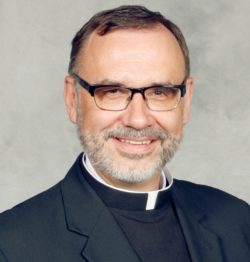Pharisee or Tax Collector?
 30th Sunday of Ordinary Time – Year C
30th Sunday of Ordinary Time – Year C
St. Luke, the author of today’s Gospel, addresses Jesus’ message to those who are self-righteous and despise others. I would like to ask you all if you consider yourselves Pharisees? Obviously, I do not ask this question in a literal sense, but rather in a spiritual sense. In other words, do you consider yourselves self-righteous? Now, I think that most of you are probably thinking to yourselves: “Surely, I am not a Pharisee. Surely, I am not self-righteous. I am a good person. People like me; they trust me; they seek my advice . . .” But are things really as we think them to be? If the Pharisee really trusted his own estimation of himself, then can we trust our estimation of ourselves?
My brothers and sisters, let us imagine for a moment if someone told us: “You are not trustworthy; you give bad advice; you are essentially a bad person with whom no one wants to associate.” What would be your reaction? Most of us would probably feel crushed and humiliated, maybe even devastated that others think so poorly of us. This is essentially everything that the tax-collector in today’s Gospel knew about himself. He knew that, because of his lifestyle, he was a social outcast; he knew that everyone knew he was a sinner. No one trusted him. No one thought well of him. No one sought his advice. In fact, people outright despised tax-collectors because they typically overtaxed the people—first, to give a lot of money to Cesar, then to give some money to the local authorities, and then to make some money themselves. So, the tax collector knew where he stood in the eyes of others. More importantly, however, because of his wretchedness, he knew where he stood in the eyes of God. He knew he was loved.
The parable of today’s Gospel is very fascinating. In this Gospel we are presented with two people. Both men are in the temple. Both men are praying to God. Both men ask God for something. One considers himself good, while the other man considers himself bad. And, it is only the one who leads a bad life and desires mercy who leaves the temple justified. If anything, my brothers and sisters, I hope this Gospel shows us that God does not look upon us as we look upon ourselves and others. God sees us in a completely different light—in His Divine Light. And what the tax collector proves is that what God desires most of all is not our perfection, but rather our hearts. He wants us to turn to Him with our whole hearts and give Him the truth—even the ugly truth—about ourselves. In this way, God can dwell within our hearts and be close to us.
Sin, is not a problem for God, because God can forgive every sin. Sometimes God might even permits us to commit certain sins, so that we can discover how we need His mercy and Love. What is most difficult for God is a hard heart—a heart that has no place for Him to fill. The Pharisee thought that he was without sin, so there was no room for God in his life. He saw no need for forgiveness and mercy. There was no imperfection through which the healing rays of God’s Love could pass to reach into the depths of the Pharisee’s heart.
On this Saturday evening/Sunday morning, I would like to ask you to take some time and consider what is hidden within your hearts.
- What does your relationship with God looks like?
- With what attitude do you approach God through prayer?
- Did you come here today in order to prove your righteousness to God?
- Or did you come, like the tax-collector, to open your heart and receive His Love in this Eucharist?
Yours in Christ,
Father Arthur
Readings for the thirtieth Sunday in Ordinary Time: Lectionary 150
Tags: #arthurmarat, #fatherarthurmarat, #frarthurmarat, #humility, #olwparish, #reflection

Comments are closed here.